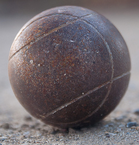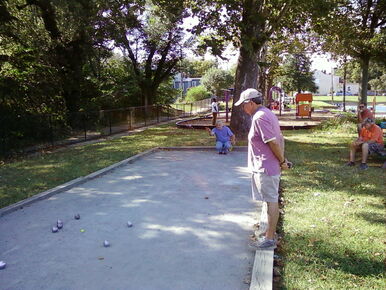The American Petanque Directory is a directory of petanque groups and clubs in the USA. It is a wiki, which means that if you see something that needs to be added, deleted, or edited, you can do it. Just like Wikipedia! To look for other clubs, or clubs in other countries, search here.
The Directory (organized by state)
|
About the American Petanque Directory
What is the American Petanque Directory?
The American Petanque Directory (APD) is an online directory of petanque clubs, groups, and terrains in the USA.
It is implemented as a wiki. This means that visitors to the Directory have the ability to update the entries in the Directory.
In a centrally administered web site, the site administrator eventually becomes a bottleneck to keeping the site updated and current. Wiki technology removes that bottleneck by making it possible for individual site visitors to update the information on the site. That means that if you, a visitor to the Directory, know of something that needs to be added, you can add it. If you know of something that needs to be corrected or updated, you can change it. Just like Wikipedia!
If you are not familiar with the concept of a wiki, this short YouTube video explains the basics, and you can consult the Wikipedia article on wikis.
▲
GUIDELINES FOR UPDATING THE DIRECTORY
Before you edit or change the directory we STRONGLY request that you read, or at least glance at, the Guidelines for updating the American Petanque Directory.
- FOR A NEW OR ALREADY-LISTED GROUP - Edit the page for the appropriate state. Add, update, or correct the entry for the group.
- FOR AN INACTIVE GROUP - DO NOT delete the entry for the group. Instead, add a note to the group's entry saying that the group is now inactive. You can also mark the group's name with
strikethrough. That way, it is clear that the Directory knows that the club once existed and that it is no longer active. - DO NOT put an email address in plaintext in a listing in the Directory. That is just asking for email spam. To learn how to provide a SAFE email address, read the Guidelines for updating the American Petanque Directory.
- For event and tournament announcements, use the Events page
How to help publicize the Directory
To be effective, the APD must be indexed by Web search engines such as Google, Yahoo, and Bing. You can help search engines find the APD by adding a link to it on your blog, web site, or Facebook page. When you link to the APD, you tell search engines that you think the APD is worth linking to. They add that link to their indexes, and that makes us show up when people search on words like "petanque".
Adding something as short as this will help a lot.
| For a directory of American petanque clubs, visit the American Petanque Directory. |
For a directory of American petanque clubs, visit the <a href="http://american-petanque-directory.wikia.com">American Petanque Directory</a>.
How to see the latest editing activity
- Go to the Activity Viewer page.
How to view a picture gallery of terrains
Visit the Directory's gallery of thumbnails.
- If you "mouse-over" a thumbnail, you can see the picture's filename/title.
- If you click on a thumbnail, the picture blows up to its full size.
How to contact our site administrator
To communicate with Jules Lenoir, you can
- add your message to the Message_Wall:Jules_Lenoir page.
- send email via a comment on the the American Petanque blog.
Why your petanque group should have a web site
Today, the Web is the tool that petanque players use to find each other, and to communicate with each other.
- Having your own web site makes it possible for people to find your group using a search engine such as Google, Yahoo, or Bing.
- Having your own web site allows you to communicate with your group without maintaining a list of email addresses.
- Having your own web site allows people to contact you without exposing your email address to spambots.
It is easy to create a web site for your group, and it is free. For instructions on how to set up a web page for your group, see How to make a web page for your club.
▲
What is petanque?

A boule
Petanque, pronounced "pay-TONK", is one of Europe's most popular outdoor games. It is a cousin of the Italian bowling game called 'bocce'. The game originated in the South of France in 1910.
The aim is to toss, or roll a number of hollow steel balls ("boules") as close as possible to a small wooden target ball (the "jack" or cochonnet - "piglet").
There are two teams with one, two, or three players each. Teams and players take turns throwing their boules. When all players have thrown all their boules, the team with the boule closest to the jack wins a point for each of its boules that is closer than the other team's closest boule. It is legal (and good strategy) to try to hit an opposing team's boules away from the jack, and even to try to hit and move the jack. The first team to score 13 points, wins the game.

The BouleFrogs of Richmond, Virginia
Unlike horseshoes, where the target stake is fixed, petanque's target ball may be hit and moved at any time, which can completely upset the score at the last second. And whereas official 'bocce' rules call for a smooth, prepared court with markers and sideboards, petanque can be played on most outdoor surfaces, without any setup.
No previous athletic skill is required. It is easy to learn, adults can play with children, and the equipment is inexpensive. It is relaxing, lots of fun, and a perfect way to make new friends.
For more information about petanque, visit Petanque Portal USA.